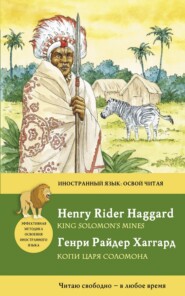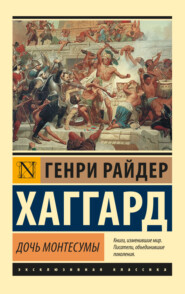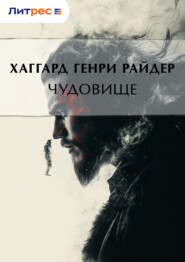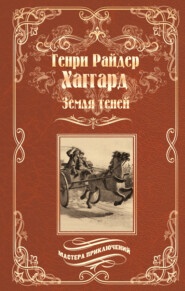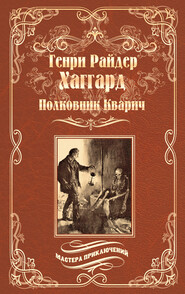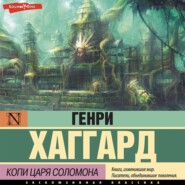По всем вопросам обращайтесь на: info@litportal.ru
(©) 2003-2024.
✖
Ayesha: The Return of She
Автор
Серия
Год написания книги
1905
Настройки чтения
Размер шрифта
Высота строк
Поля
“Let me light a candle first,” I said.
“Never mind the candle, Horace; I would rather speak in the dark. I went to sleep, and I dreamed the most vivid dream that ever came to me. I seemed to stand under the vault of heaven, it was black, black, not a star shone in it, and a great loneliness possessed me. Then suddenly high up in the vault, miles and miles away, I saw a little light and thought that a planet had appeared to keep me company. The light began to descend slowly, like a floating flake of fire. Down it sank, and down and down, till it was but just above me, and I perceived that it was shaped like a tongue or fan of flame. At the height of my head from the ground it stopped and stood steady, and by its ghostly radiance I saw that beneath was the shape of a woman and that the flame burned upon her forehead. The radiance gathered strength and now I saw the woman.
“Horace, it was Ayesha herself, her eyes, her lovely face, her cloudy hair, and she looked at me sadly, reproachfully, I thought, as one might who says, ‘Why did you doubt?’
“I tried to speak to her but my lips were dumb. I tried to advance and to embrace her, my arms would not move. There was a barrier between us. She lifted her hand and beckoned as though bidding me to follow her.
“Then she glided away, and, Horace, my spirit seemed to loose itself from the body and to be given the power to follow. We passed swiftly eastward, over lands and seas, and – I knew the road. At one point she paused and I looked downwards. Beneath, shining in the moonlight, appeared the ruined palaces of Kôr, and there not far away was the gulf we trod together.
“Onward above the marshes, and now we stood upon the Ethiopian’s Head, and gathered round, watching us earnestly, were the faces of the Arabs, our companions who drowned in the sea beneath. Job was among them also, and he smiled at me sadly and shook his head, as though he wished to accompany us and could not.
“Across the sea again, across the sandy deserts, across more sea, and the shores of India lay beneath us. Then northward, ever northward, above the plains, till we reached a place of mountains capped with eternal snow. We passed them and stayed for an instant above a building set upon the brow of a plateau. It was a monastery, for old monks droned prayers upon its terrace. I shall know it again, for it is built in the shape of a half-moon and in front of it sits the gigantic, ruined statue of a god who gazes everlastingly across the desert. I knew, how I cannot say, that now we were far past the furthest borders of Tibet and that in front of us lay untrodden lands. More mountains stretched beyond that desert, a sea of snowy peaks, hundreds and hundreds of them.
“Near to the monastery, jutting out into the plain like some rocky headland, rose a solitary hill, higher than all behind. We stood upon its snowy crest and waited, till presently, above the mountains and the desert at our feet shot a sudden beam of light that beat upon us like some signal flashed across the sea. On we went, floating down the beam – on over the desert and the mountains, across a great flat land beyond, in which were many villages and a city on a mound, till we lit upon a towering peak. Then I saw that this peak was loop-shaped like the symbol of Life of the Egyptians – the crux-ansata – and supported by a lava stem hundreds of feet in height. Also I saw that the fire which shone through it rose from the crater of a volcano beyond. Upon the very crest of this loop we rested a while, till the Shadow of Ayesha pointed downward with its hand, smiled and vanished. Then I awoke.
“Horace, I tell you that the sign has come to us.”
His voice died away in the darkness, but I sat still, brooding over what I had heard. Leo groped his way to me and, seizing my arm, shook it.
“Are you asleep?” he asked angrily. “Speak, man, speak!”
“No,” I answered, “never was I more awake. Give me time.”
Then I rose, and going to the open window, drew up the blind and stood there staring at the sky, which grew pearl-hued with the first faint tinge of dawn. Leo came also and leant upon the window-sill, and I could feel that his body was trembling as though with cold. Clearly he was much moved.
“You talk of a sign,” I said to him, “but in your sign I see nothing but a wild dream.”
“It was no dream,” he broke in fiercely; “it was a vision.”
“A vision then if you will, but there are visions true and false, and how can we know that this is true? Listen, Leo. What is there in all that wonderful tale which could not have been fashioned in your own brain, distraught as it is almost to madness with your sorrow and your longings? You dreamed that you were alone in the vast universe. Well, is not every living creature thus alone? You dreamed that the shadowy shape of Ayesha came to you. Has it ever left your side? You dreamed that she led you over sea and land, past places haunted by your memory, above the mysterious mountains of the Unknown to an undiscovered peak. Does she not thus lead you through life to that peak which lies beyond the Gates of Death? You dreamed – ”
“Oh! no more of it,” he exclaimed. “What I saw, I saw, and that I shall follow. Think as you will, Horace, and do what you will. To-morrow I start for India, with you if you choose to come; if not, without you.”
“You speak roughly, Leo,” I said. “You forget that I have had no sign, and that the nightmare of a man so near to insanity that but a few hours ago he was determined upon suicide, will be a poor staff to lean on when we are perishing in the snows of Central Asia. A mixed vision, this of yours, Leo, with its mountain peak shaped like a crux-ansata and the rest. Do you suggest that Ayesha is re-incarnated in Central Asia – as a female Grand Lama or something of that sort?”
“I never thought of it, but why not?” asked Leo quietly. “Do you remember a certain scene in the Caves of Kôr yonder, when the living looked upon the dead, and dead and living were the same? And do you remember what Ayesha swore, that she would come again – yes, to this world; and how could that be except by re-birth, or, what is the same thing, by the transmigration of the spirit?”
I did not answer this argument. I was struggling with myself.
“No sign has come to me,” I said, “and yet I have had a part in the play, humble enough, I admit, and I believe that I have still a part.”
“No,” he said, “no sign has come to you. I wish that it had. Oh! how I wish you could be convinced as I am, Horace!”
Then we were silent for a long while, silent, with our eyes fixed upon the sky.
It was a stormy dawn. Clouds in fantastic masses hung upon the ocean. One of them was like a great mountain, and we watched it idly. It changed its shape, the crest of it grew hollow like a crater. From this crater sprang a projecting cloud, a rough pillar with a knob or lump resting on its top. Suddenly the rays of the risen sun struck upon this mountain and the column and they turned white like snow. Then as though melted by those fiery arrows, the centre of the excrescence above the pillar thinned out and vanished, leaving an enormous loop of inky cloud.
“Look,” said Leo in a low, frightened voice, “that is the shape of the mountain which I saw in my vision. There upon it is the black loop, and there through it shines the fire. It would seem that the sign is for both of us, Horace.”
I looked and looked again till presently the vast loop vanished into the blue of heaven. Then I turned and said – ”I will come with you to Central Asia, Leo.”
Chapter 2
The Lamasery
Sixteen years had passed since that night vigil in the old Cumberland house, and, behold! we two, Leo and I, were still travelling, still searching for that mountain peak shaped like the Symbol of Life which never, never could be found.
Our adventures would fill volumes, but of what use is it to record them. Many of a similar nature are already written of in books; those that we endured were more prolonged, that is all. Five years we spent in Tibet, for the most part as guests of various monasteries, where we studied the law and traditions of the Lamas. Here we were once sentenced to death in punishment for having visited a forbidden city, but escaped through the kindness of a Chinese official.
Leaving Tibet, we wandered east and west and north, thousands and thousands of miles, sojourning amongst many tribes in Chinese territory and elsewhere, learning many tongues, enduring much hardship. Thus we would hear a legend of a place, say nine hundred miles away, and spend two years in reaching it, to find when we came there, nothing.
And so the time went on. Yet never once did we think of giving up the quest and returning, since, before we started, we had sworn an oath that we would achieve or die. Indeed we ought to have died a score of times, yet always were preserved, most mysteriously preserved.
Now we were in country where, so far as I could learn, no European had ever set a foot. In a part of the vast land called Turkestan there is a great lake named Balhkash, of which we visited the shores. Two hundred miles or so to the westward is a range of mighty mountains marked on the maps as Arkarty-Tau, on which we spent a year, and five hundred or so to the eastward are other mountains called Cherga, whither we journeyed at last, having explored the triple ranges of the Tau.
Here it was that at last our true adventures began. On one of the spurs of these awful Cherga mountains – it is unmarked on any map – we well-nigh perished of starvation. The winter was coming on and we could find no game. The last traveller we had met, hundreds of miles south, told us that on that range was a monastery inhabited by Lamas of surpassing holiness. He said that they dwelt in this wild land, over which no power claimed dominion and where no tribes lived, to acquire “merit,” with no other company than that of their own pious contemplations. We did not believe in its existence, still we were searching for that monastery, driven onward by the blind fatalism which was our only guide through all these endless wanderings. As we were starving and could find no “argals,” that is fuel with which to make a fire, we walked all night by the light of the moon, driving between us a single yak – for now we had no attendant, the last having died a year before.
He was a noble beast, that yak, and had the best constitution of any animal I ever knew, though now, like his masters, he was near his end. Not that he was over-laden, for a few rifle cartridges, about a hundred and fifty, the remnant of a store which we had fortunately been able to buy from a caravan two years before, some money in gold and silver, a little tea and a bundle of skin rugs and sheepskin garments were his burden. On, on we trudged across a plateau of snow, having the great mountains on our right, till at length the yak gave a sigh and stopped. So we stopped also, because we must, and wrapping ourselves in the skin rugs, sat down in the snow to wait for daylight.
“We shall have to kill him and eat his flesh raw,” I said, patting the poor yak that lay patiently at our side.
“Perhaps we may find game in the morning,” answered Leo, still hopeful.
“And perhaps we may not, in which case we must die.”
“Very good,” he replied, “then let us die. It is the last resource of failure. We shall have done our best.”
“Certainly, Leo, we shall have done our best, if sixteen years of tramping over mountains and through eternal snows in pursuit of a dream of the night can be called best.”
“You know what I believe,” he answered stubbornly, and there was silence between us, for here arguments did not avail. Also even then I could not think that all our toils and sufferings would be in vain.
The dawn came, and by its light we looked at one another anxiously, each of us desiring to see what strength was left to his companion. Wild creatures we should have seemed to the eyes of any civilized person. Leo was now over forty years of age, and certainly his maturity had fulfilled the promise of his youth, for a more magnificent man I never knew. Very tall, although he seemed spare to the eye, his girth matched his height, and those many years of desert life had turned his muscles to steel. His hair had grown long, like my own, for it was a protection from sun and cold, and hung upon his neck, a curling, golden mane, as his great beard hung upon his breast, spreading outwards almost to the massive shoulders. The face, too – what could be seen of it – was beautiful though burnt brown with weather; refined and full of thought, sombre almost, and in it, clear as crystal, steady as stars, shone his large grey eyes.
And I – I was what I have always been – ugly and hirsute, iron-grey now also, but in spite of my sixty odd years, still wonderfully strong, for my strength seemed to increase with time, and my health was perfect. In fact, during all this period of rough travels, although now and again we had met with accidents which laid us up for awhile, neither of us had known a day of sickness. Hardship seemed to have turned our constitutions to iron and made them impervious to every human ailment. Or was this because we alone amongst living men had once inhaled the breath of the Essence of Life?
Our fears relieved – for notwithstanding our foodless night, as yet neither of us showed any signs of exhaustion – we turned to contemplate the landscape. At our feet beyond a little belt of fertile soil, began a great desert of the sort with which we were familiar – sandy, salt-encrusted, treeless, waterless, and here and there streaked with the first snows of winter. Beyond it, eighty or a hundred miles away – in that lucent atmosphere it was impossible to say how far exactly – rose more mountains, a veritable sea of them, of which the white peaks soared upwards by scores.
As the golden rays of the rising sun touched their snows to splendour, I saw Leo’s eyes become troubled. Swiftly he turned and looked along the edge of the desert.
“See there!” he said, pointing to something dim and enormous. Presently the light reached it also. It was a mighty mountain not more than ten miles away, that stood out by itself among the sands. Then he turned once more, and with his back to the desert stared at the slope of the hills, along the base of which we had been travelling. As yet they were in gloom, for the sun was behind them, but presently light began to flow over their crests like a flood. Down it crept, lower, and yet lower, till it reached a little plateau not three hundred yards above us. There, on the edge of the plateau, looking out solemnly across the waste, sat a great ruined idol, a colossal Buddha, while to the rear of the idol, built of yellow stone, appeared the low crescent-shaped mass of a monastery.
“At last!” cried Leo, “oh, Heaven! at last!” and, flinging himself down, he buried his face in the snow as though to hide it there, lest I should read something written on it which he did not desire that even I should see.
I let him lie a space, understanding what was passing in his heart, and indeed in mine also. Then going to the yak that, poor brute, had no share in these joyous emotions but only lowed and looked round with hungry eyes, I piled the sheepskin rugs on to its back. This done, I laid my hand on Leo’s shoulder, saying, in the most matter-of-fact voice I could command —
“Come. If that place is not deserted, we may find food and shelter there, and it is beginning to storm again.”
He rose without a word, brushed the snow from his beard and garments and came to help me to lift the yak to its feet, for the worn-out beast was too stiff and weak to rise of itself. Glancing at him covertly, I saw on Leo’s face a very strange and happy look; a great peace appeared to possess him.






